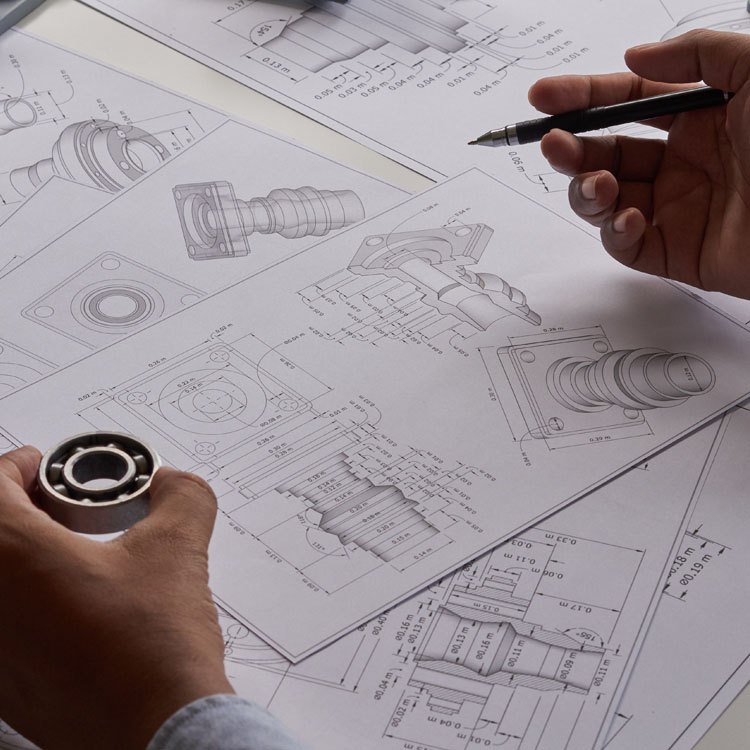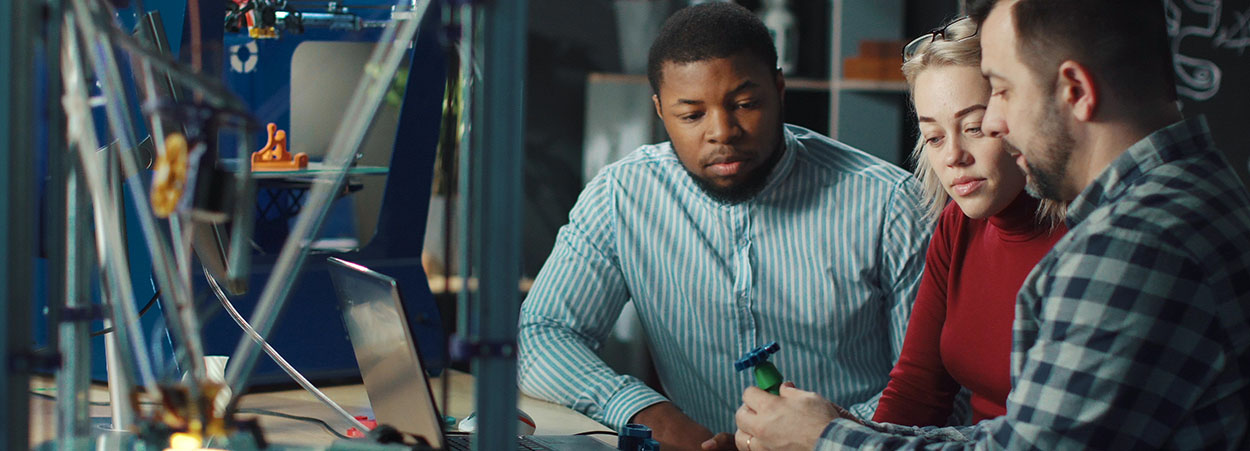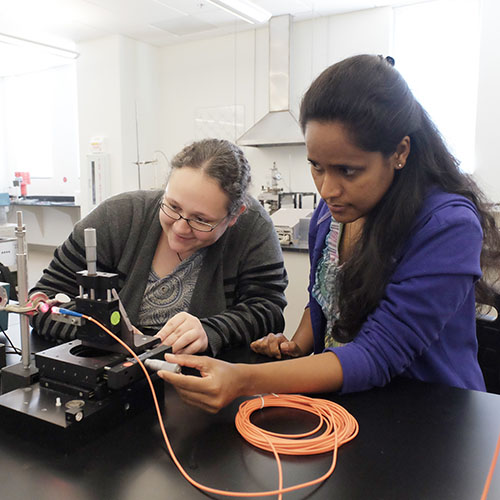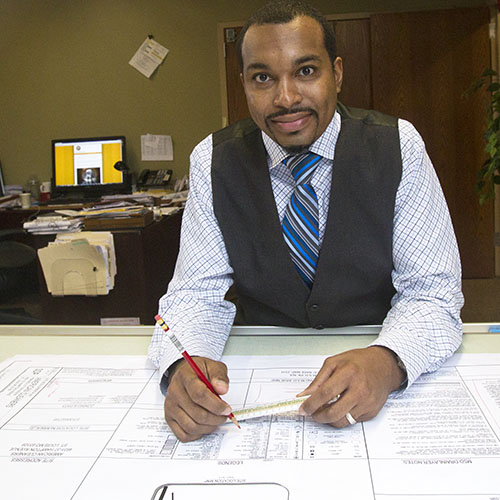The Joint Engineering program will continue with the support of UMSL and Washington University through summer 2029. New students will no longer be admitted to the program after January 2026. If you are interested in majoring in engineering at UMSL and are starting after January 2026, please visit the Mechanical Engineering major in the School of Engineering.
Design the future with our ABET-accredited mechanical engineering degree
Are you fascinated by finding out how things work? Do you dream of a career designing and improving a variety of products and machines? The University of Missouri–St. Louis’ Bachelor of Science in Mechanical Engineering from the Joint Engineering Program will prepare you for some of the most exciting careers around, solving issues and improving the lives of millions of people while earning an impressive mechanical engineering salary.
Our balance of theory and experiential learning provides you with the necessary expertise and knowledge to stand out on the job market or as you apply to graduate programs. In fact, 95 percent of our 2020 mechanical engineering degree graduates are either employed or in a graduate program.
If you’re like most students considering our program, you’re wondering, “What is mechanical engineering?” Well, mechanical engineering means researching, designing, developing, building and testing devices like mechanical and thermal sensors, tools, engines and gas turbines — to name only a few.
The Bachelor of Science in Mechanical Engineering (BSME) is accredited by the Engineering Accreditation Commission of ABET, under the General Criteria and the Mechanical Engineering Program Criteria.
A mechanical engineering degree designed around you
When you major in mechanical engineering at UMSL, you’ll have the freedom and flexibility to create a course of study that works with your schedule. With online, late afternoon and evening classes, our mechanical engineering degree program gives you the time to work, care for your family and pursue internships and co-op positions in some of the many engineering firms in the region.
Program type:
Major, BSME
Format:
On-Campus
Take the next step
Request more information below:

Why major in mechanical engineering at UMSL?
With great job placement and ABET accreditation, our program is recognized for the expertise and experience of our graduates:
- Gain real-world experience. As you earn your mechanical engineering degree, you’ll have many chances to participate in internships and work-study programs with mechanical engineering services around the area to make connections and build a robust resume.
- Work with professionals. Our small class sizes allow you to work closely with distinguished faculty mentors who bring their years of experience as researchers and engineers into their classrooms to help you answer for yourself, “What is mechanical engineering?”
- Prepare for a career. When you major in mechanical engineering, you’ll work with a mentor in the industry who will help you connect your knowledge from class to real-world settings, so you’ll be well-prepared to graduate and begin earning a high mechanical engineering salary sooner.
What can you do with a mechanical engineering degree?
You may still be wondering, “What is mechanical engineering and what kinds of careers can I get with a degree in it?” Well, the answer depends on your interests and career goals. A Bachelor of Science in Mechanical Engineering is very versatile and opens the door to many positions that will earn you a fantastic mechanical engineering salary.
According to the U.S. Bureau of Labor Statistics, the average mechanical engineering salary is $99,510, with a projected growth in employment of 10 percent over the next decade.
Students who major in mechanical engineering at UMSL often go on to work at prestigious companies and organizations that specialize in alternative energy, automotive manufacturing, biomechanics, environmental control and robotics development and application.
Many of our mechanical engineering degree graduates are accepted into top graduate programs to continue improving their strengths and working toward even higher mechanical engineering salaries.
99,510
10
Career Opportunities
- Aerospace engineer
- Automotive engineer
- Biomedical engineer
- Business executive
- Construction engineer
- Entrepreneur
- Petroleum engineer
- Process engineer
- Product designer
- Quality engineer
Program Educational Objectives
The objectives are to:
-
Meet the expectations of employers of mechanical engineers and acquire the professional experience necessary for career advancement.
-
Pursue higher learning and advanced knowledge to adapt to evolving technologies and needs of the world.
- Actively engage with communities to account for societal impacts with high ethical standards.
Student Outcomes
Upon completion of the program, graduates will have an ability to:
-
identify, formulate, and solve complex engineering problems by applying principles of engineering, science, and mathematics;
-
apply engineering design to produce solutions that meet specified needs with consideration of public health, safety, and welfare, as well as global, cultural, social, environmental, and economic factors;
-
communicate effectively with a range of audiences;
-
recognize ethical and professional responsibilities in engineering situations and make informed judgments, which must consider the impact of engineering solutions in global, economic, environmental, and societal contexts;
-
function effectively on a team whose members together provide leadership, create a collaborative environment, establish goals, plan tasks, and meet objectives;
-
develop and conduct appropriate experimentation, analyze and interpret data, and use engineering judgment to draw conclusions and
-
acquire and apply new knowledge as needed, using appropriate learning strategies.
Plan of study
A program of 132 semester hours is required for the Bachelor of Science in Mechanical Engineering.
-
Majors must complete the University General Education and Graduation requirements, the Pre-Engineering Requirements, the Core Engineering Requirements, and Major Requirements.
-
Majors must first complete JE MATH 3170, Engineering Mathematics, with a minimum grade of C-.
-
Majors must also complete JE ENGR 2300, Introduction to Electrical Networks, with a minimum grade of C-.
-
A minimum grade of C- is necessary to meet the prerequisite requirement for any course.
General Education Requirements
The following courses fulfill general education and graduation requirements and are required of Mechanical Engineering majors:
| PHIL 2259 | Engineering Ethics | 3 |
| PHIL 3380 | Philosophy of Science | 3 |
| HIST 1001 OR HIST 1002 |
American Civilization 1865 to Present (MOTR HIST 102) | 3 |
| Three Additional Science Courses 1 | 9 | |
Total Hours |
18 |
|
| 1 One Social Science course must satisfy the Cultural Diversity Requirement. Humanities and social sciences electives must meet both the University of Missouri—St. Louis General Education Requirements and the Humanities and Social Sciences Requirements of the Joint Undergraduate Engineering Program. Check with your advisor for details. | ||
Pre-Engineering Requirements
Students seeking to major in engineering are first designated as ‘Undeclared with an interest in Engineering majors’ until they have completed Math 1800 Analytical Geometry & Calculus I. Upon successful completion of Math 1800 with a grade of C or better, students will be allowed to declare pre-engineering as their major. Math 1800 must be completed successfully within two attempts.
| MATH 1800 | Analytic Geometry and Calculus I | 5 |
| MATH 1900 | Analytic Geometry and Calculus II | 5 |
| MATH 2000 | Analytic Geometry and Calculus III | 5 |
| MATH 2020 | Introduction to Differential Equations | 3 |
| CHEM 1111 | Introductory Chemistry I (MOTR CHEM 150L) | 5 |
| PHYSICS 2111 | Physics: Mechanics and Heat | 4 |
| PHYSICS 2111L | Mechanics and Heat Laboratory | 1 |
| PHYSICS 2112 | Physics: Electricity, Magnetism, and Optics | 4 |
| PHYSICS 2112L | Electricity, Magnetism, and Optics Laboratory | 1 |
| ENGR 2310 | Statics | 3 |
| ENGR 2320 | Dynamics | 3 |
| ENGL 1100 | First-Year Writing (MOTR ENGL 200) | 3 |
Total Hours |
42 |
|
Engineering Core Requirements
| CMP SCI 1250 | Introduction to Computing | 3 |
| J E COMM 2000 | Engineering Studio I | 1 |
| J E MATH 3170 | Engineering Mathematics | 4 |
| ENGL 3130 | Technical Writing | 3 |
Total Hours |
11 |
|
Mechanical Engineering Major Requirements
| Math 1320 | Introduction to Probability and Statistics | 3 |
| J M ENGR 4950 | Fundamentals of Mechanical Engineering Review | 1 |
| J CMP SC 1002 | Introduction to Computing Tools: Matlab Skills | 1 |
| J E ENGR 2300 | Introduction to Electrical Networks | 3 |
| J E ENGR 2340 | Electrical Laboratory for Mechanical Engineers | 1 |
| J M ENGR 1413 | Introduction to Engineering Design: CAD | 2 |
| J M ENGR 1414 | Introduction to Engineering Design: Project | 2 |
| J M ENGR 2110 | Machine Shop, Fabrication, and Prototyping | 2 |
| J M ENGR 2410 | Mechanics of Deformable Bodies | 3 |
| J M ENGR 3110 | Mechanical Design and Machine Elements | 3 |
| J M ENGR 3200 | Thermodynamics | 3 |
| J M ENGR 3250 | Material Science for J M ENGR | 4 |
| J M ENGR 3700 | Fluid Mechanics | 3 |
| J M ENGR 3710 | Principles of Heat Transfer | 3 |
| J M ENGR 3722 | Heat Transfer Laboratory | 1 |
| J M ENGR 4120 | Design of Thermal Systems | 3 |
| J M ENGR 4170 | Dynamic Response of Physical Systems | 2 |
| J M ENGR 4180 | Dynamic Response Laboratory | 1 |
| J M ENGR 4110 | Mechanical Engineering Design Project | 3 |
| J M ENGR 4310/J E ENGR 4410 | Control Systems I | 3 |
| J M ENGR 4990 | Mechanical Engineering Senior Seminar | 1 |
| Mechanical Engineering Electives | 12 | |
Total Hours |
61 |
|
All majors must meet the general education requirements of the university in addition to completing degree-specific curriculum requirements.
Review Full Degree Requirements Review Sample Four-Year Plan
Non-Missouri Residents: Prospective students are responsible for reviewing the UMSL state authorizations page to see if this program is offered in their state throughout their program and to review the licensure or certification requirements for the state in which they reside.
| Academic Year | Enrollment | Graduates |
|---|---|---|
| 2018-2019 | 133 | 33 |
| 2019-2020 | 143 | 45 |
| 2020-2021 | 129 | 37 |
| 2021-2022 | 114 | 28 |
| 2022-2023 | 99 | 27 |
| 2023-2024 | 110 | 32 |
Student organizations
Make new friends and learn new skills by joining one of our Recognized Student Organizations. Here are several opportunities you may be interested in as a mechanical engineering major:
- Society of Future Engineers
- Student Government Association
- Students of the University of Missouri
Internship opportunities
St. Louis employers regularly engage with the Joint Engineering Program and use internships and co-ops as a pathway for talent. The majority of Joint Program students are able to jump-start their careers by working part time as interns while attending classes.
Honors College
The UMSL Honors College is a certificate program that can be paired with any major without adding extra classes or extending time to graduate. Classes in the Honors College are seminar-style, meaning that they are based in reading, writing, discussion, and critical thinking. This unique class format fosters an intellectual climate centered around democracy, civility and academic excellence.
Undergraduate research
We encourage and support students as they engage in exciting activities in and outside of the classroom that enrich their academic and professional understanding of their chosen area of study. All majors are encouraged to participate in Undergraduate Research and Scholarship to produce discipline-specific intellectual or creative innovations to their field.








